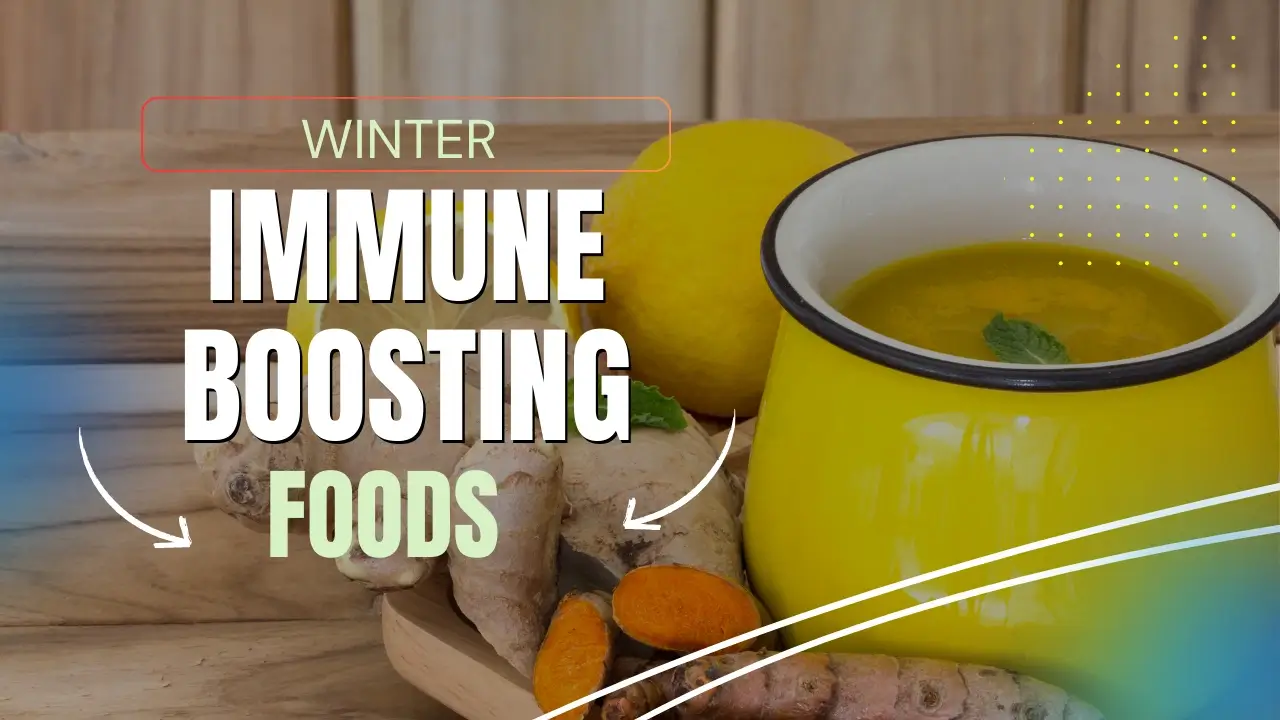As the chill of winter sets in, staying healthy becomes a priority. Incorporating immune boosting foods in winter into your daily diet is one of the best ways to safeguard yourself against seasonal illnesses. These foods not only keep your immunity strong but also provide the warmth and nourishment your body craves during colder months. In this guide, we will delve deep into the benefits of these foods, explain their role in strengthening immunity, and share practical tips on including them in your meals.
Why Focus on Immune Boosting Foods in Winter?
Winter is a season of lowered immunity for most people, and this is due to several factors:
- Drop in Vitamin D Levels: Less sunlight means reduced synthesis of vitamin D, which is critical for immune health.
- Rise of Seasonal Viruses: Colder temperatures provide an ideal environment for viruses, such as the flu and common cold, to thrive.
- Dietary Changes: Heavier comfort foods may replace nutrient-rich options, potentially weakening your immune defenses.
To combat these challenges, relying on immune boosting foods in winter is essential. They can fill the nutritional gaps caused by weather changes while protecting your body from seasonal ailments.
Top 15 Immune Boosting Foods in Winter
1. Citrus Fruits: The Ultimate Immunity Enhancer

Citrus fruits like oranges, lemons, and limes are celebrated as effective immune boosting foods in winter due to their high vitamin C content. This essential nutrient promotes the production of white blood cells, which play a key role in fighting infections.
- How to Include: Enjoy freshly squeezed orange juice or add a splash of lemon to warm water in the morning.
- Why They Work: The antioxidants in citrus fruits also protect your body against oxidative stress.
2. Ginger: A Winter Favourite
Ginger is one of the most widely used spices in Indian households and is renowned for its anti-inflammatory and antibacterial properties.
- How to Include: Brew ginger tea or use freshly grated ginger in soups and stir-fries.
- Why It Works: Ginger’s active compound, gingerol, boosts immunity and helps alleviate winter-related ailments like colds and coughs.
3. Turmeric: Golden Goodness for Health
Turmeric, a cornerstone of Indian cuisine, is another potent immune booster. Its active ingredient, curcumin, is a powerful anti-inflammatory agent that enhances the body’s ability to fight infections.
- How to Include: Mix turmeric in warm milk (haldi doodh) or incorporate it into curries.
- Why It Works: Turmeric not only strengthens immunity but also provides relief from joint pain, a common issue during winter.
The Role of Seasonal Vegetables in Winter Immunity
4. Spinach and Leafy Greens
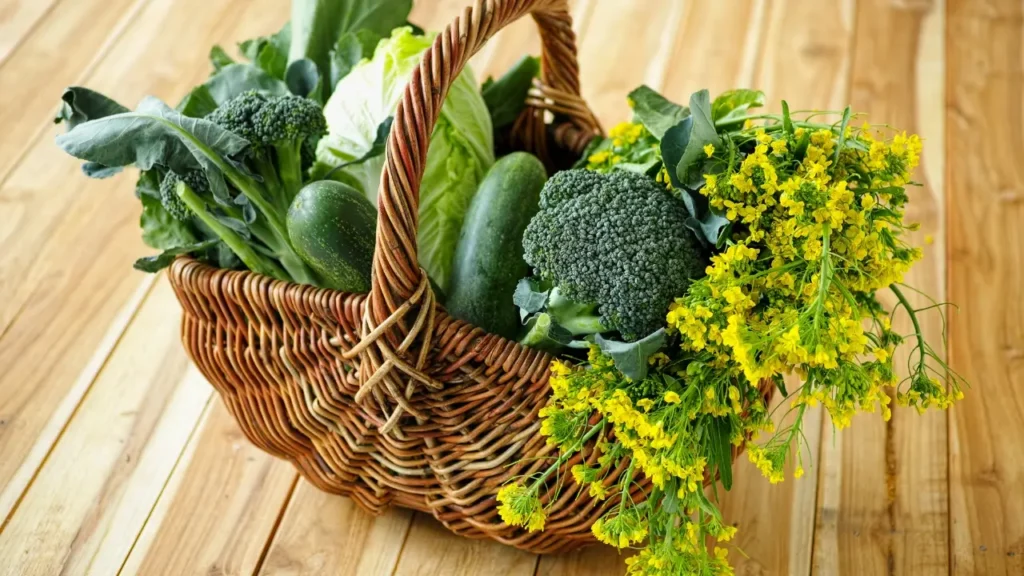
Spinach, fenugreek (methi), and mustard greens (sarson) are excellent sources of iron, vitamin C, and beta-carotene. These nutrients support immune function and overall health.
- How to Include: Prepare dishes like sarson ka saag or methi paratha.
- Why They Work: The antioxidants in these greens protect the body from free radical damage.
5. Carrots and Root Vegetables
Rich in beta-carotene, carrots are a seasonal favourite that converts to vitamin A, a vital nutrient for immune health. Other root vegetables like beets are equally beneficial.
- How to Include: Add these vegetables to soups, stews, or roasted dishes.
- Why They Work: Their natural sweetness and rich nutrient profile make them ideal for winter meals.
Spices and Herbs: Winter’s Natural Medicine
6. Garlic: Nature’s Antibiotic
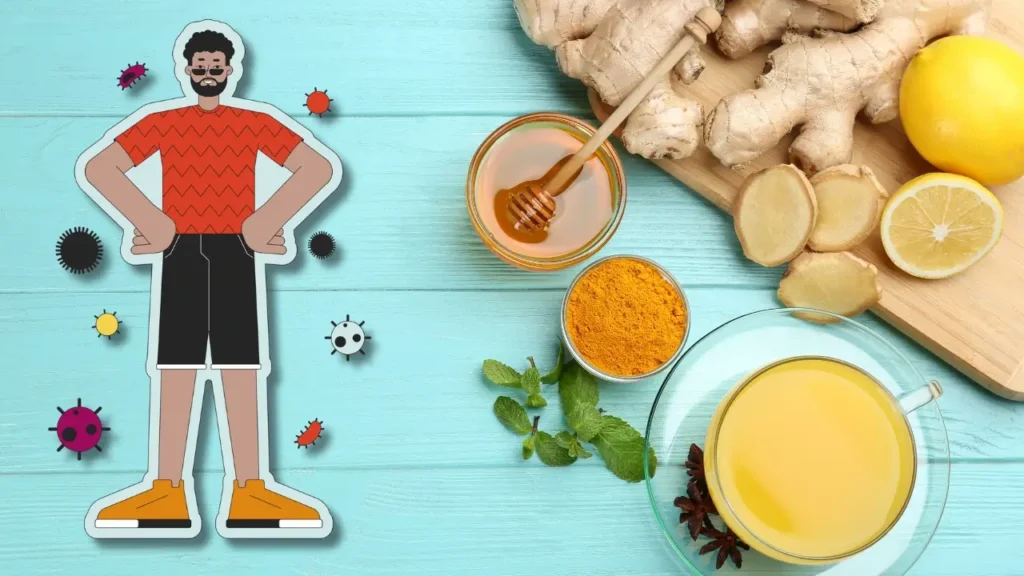
Garlic’s immune-boosting properties stem from allicin, a compound known for its antimicrobial effects.
- How to Include: Use garlic in chutneys, curries, or roasted vegetables.
- Why It Works: Regular consumption of garlic reduces the risk of catching colds and other infections.
7. Tulsi and Black Pepper
Tulsi (holy basil) and black pepper are two Indian staples that offer significant immunity benefits.
- How to Include: Add tulsi leaves to your tea or sprinkle black pepper on soups and salads.
- Why They Work: Both ingredients improve respiratory health, making them perfect for winter use.
Also Read: Reasons Why You Should Eat Peanuts in Winter: The Surprising Health Secret You Can’t Ignore!
Protein-Rich Immune Boosters
8. Yogurt: A Probiotic Powerhouse
Yogurt is not only delicious but also rich in probiotics that maintain gut health—a key factor for a robust immune system.
- How to Include: Enjoy yogurt as a raita or as part of your breakfast.
- Why It Works: A healthy gut supports overall immunity, reducing the chances of winter illnesses.
9. Nuts and Seeds
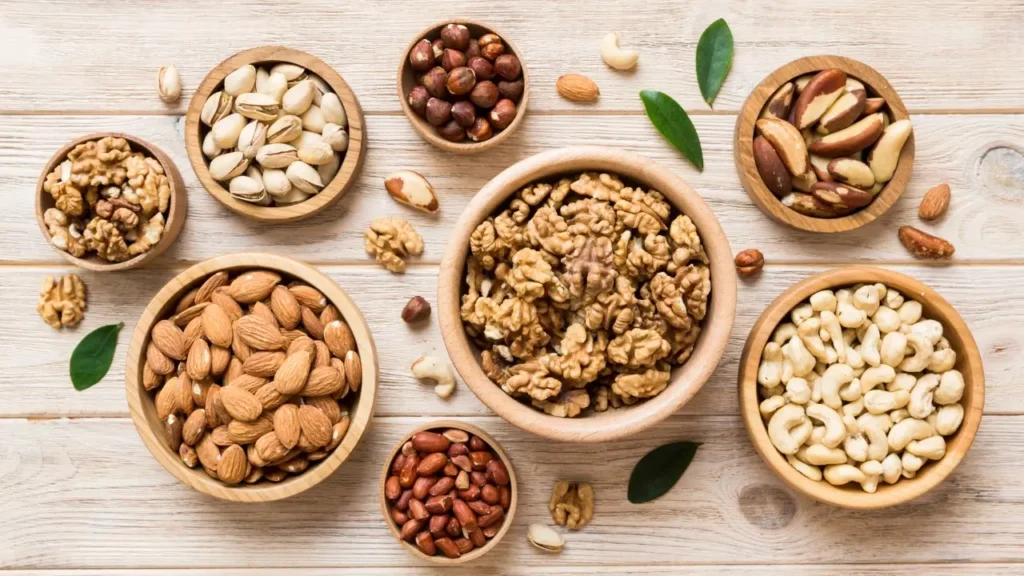
Almonds, walnuts, flaxseeds, and sunflower seeds are packed with zinc, vitamin E, and healthy fats that promote immunity.
- How to Include: Add them to salads, smoothies, or desserts.
- Why They Work: These superfoods provide lasting energy while supporting immune function.
Sweet Treats with Immunity Benefits
10. Jaggery and Honey
Jaggery (gur) and honey are natural sweeteners with medicinal properties. They are rich in minerals and antioxidants that bolster the immune system.

- How to Include: Use jaggery in desserts or honey as a topping for your breakfast cereals.
- Why They Work: They also help soothe sore throats and provide instant energy.
Immune Boosting Beverages in Winter
11. Herbal Teas
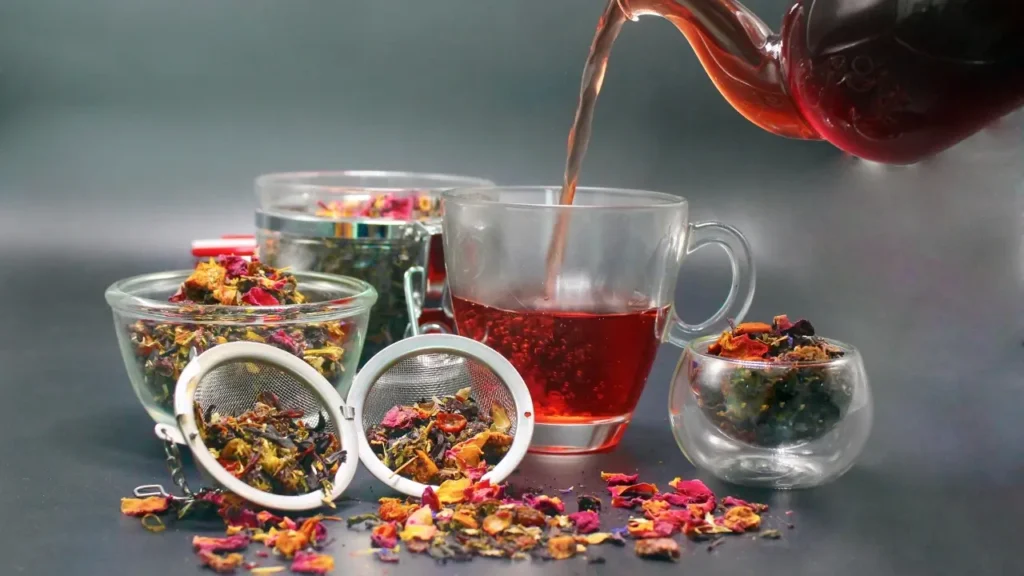
Herbal teas like chamomile, ginger, and tulsi tea are warming and immunity-enhancing.
- How to Include: Sip on these teas during the evening or after meals.
- Why They Work: Their anti-inflammatory properties ease winter-related discomforts.
12. Bone Broth
Bone broth is a nutrient-dense option rich in collagen, amino acids, and minerals.
- How to Include: Prepare a homemade broth with your choice of vegetables and spices.
- Why It Works: It supports gut health and keeps you warm on chilly days.
Practical Tips for Using Immune Boosting Foods in Winter
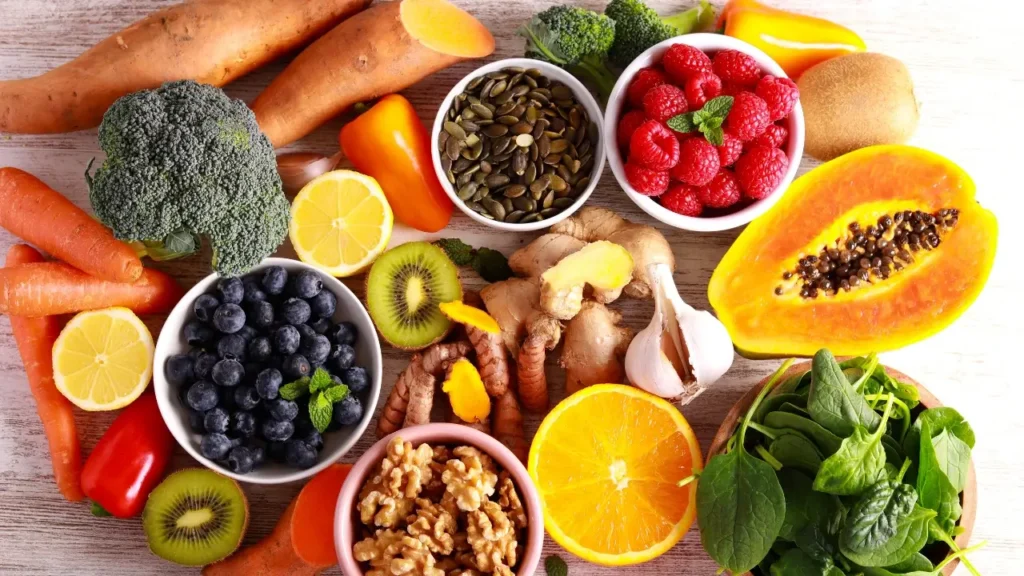
Winter is the season where the right foods can make all the difference in keeping your immunity strong and your energy levels high. By incorporating immune boosting foods in winter into your daily routine, you can shield yourself from seasonal illnesses while enjoying the delicious bounty of the season. Here, we share practical tips to ensure that you make the most of these powerful foods.
1. Embrace Fresh and Seasonal Produce
One of the simplest ways to stay healthy is by eating fresh, locally available fruits and vegetables. Seasonal produce is naturally enriched with nutrients your body needs during winter.
- Why Seasonal Foods Matter: Seasonal fruits like oranges, guavas, and vegetables such as spinach and carrots are packed with vitamins and antioxidants that enhance immunity.
- How to Use Them: Add spinach to curries or smoothies and enjoy carrots in soups or as snacks. Opt for fresh citrus fruits as a mid-morning treat.
2. Stay Hydrated with Immune-Boosting Beverages
Although the cold weather might reduce your thirst, staying hydrated is crucial for maintaining immunity. Warming beverages with immune-boosting ingredients can do wonders.

- Try Herbal Teas: Tulsi, ginger, and chamomile teas are excellent for reducing inflammation and fighting infections.
- Don’t Forget Bone Broth: Rich in collagen and amino acids, bone broth provides essential nutrients to support your immune system.
3. Spice Up Your Meals with Winter Super Spices
Indian spices like turmeric, ginger, garlic, and black pepper are more than just flavor enhancers—they are powerful immunity boosters.
- Incorporate Turmeric and Ginger: Mix turmeric into milk for a comforting bedtime drink, or use grated ginger in teas and soups.
- Use Garlic Generously: Add it to stir-fries, curries, or roasted vegetables for a natural antibiotic effect.
4. Opt for Protein-Rich Foods to Build Strength
Proteins are essential for cell repair and building a strong immune system, especially during the winter months. Include protein-rich foods like yogurt, nuts, seeds, and legumes in your meals.
- Why Yogurt is Key: Its probiotics improve gut health, which is closely tied to overall immunity.
- Nuts and Seeds for Snacking: Munch on almonds, walnuts, and flaxseeds to stay nourished between meals.
5. Sweeten Naturally with Jaggery and Honey
Replace refined sugars with natural sweeteners like jaggery (gur) and honey to enjoy both flavor and health benefits. These traditional ingredients are not only delicious but also loaded with antioxidants and minerals.
- Use Jaggery in Desserts: Prepare winter classics like gajar ka halwa or laddoos with jaggery.
- Add Honey to Drinks: Drizzle honey into teas or over warm toast for a wholesome treat.
6. Create Balanced Meals for Comprehensive Nutrition
Your meals should be a balanced mix of macronutrients and micronutrients to meet all your dietary needs. Focus on variety and moderation.
- Include Whole Grains: Whole grains like millet (bajra) and wheat provide sustained energy and are perfect for warming dishes like khichdi or roti.
- Add Healthy Fats: Use ghee or cold-pressed oils for cooking to improve vitamin absorption and boost immunity.
7. Prepare Comfort Foods with a Healthy Twist
Winter is synonymous with comfort foods, but they don’t have to be unhealthy. You can create delicious, nourishing meals that also support immunity.
- Try Soups and Stews: Add a mix of seasonal vegetables and spices for a nutrient-rich meal.
- Make Immunity-Boosting Snacks: Try roasted chickpeas or seed mixes for a crunchy, healthful option.
8. Incorporate Fermented Foods for Gut Health
Fermented foods like pickles, idli, dosa, and kimchi are rich in probiotics, which support gut health—a key factor in immunity.
- Why Gut Health Matters: A healthy gut microbiome can better fight off infections.
- How to Add Them: Pair pickles with parathas or enjoy fermented batter-based dishes for breakfast.
9. Cook Mindfully to Retain Nutrients
The way you prepare your food can significantly impact its nutritional value. Use methods that preserve nutrients and add flavor.
- Steam or Roast Vegetables: Avoid overcooking to retain vitamins and minerals.
- Use Minimal Oil: Opt for sautéing instead of deep frying to keep your meals lighter and healthier.
10. Plan Ahead for Consistency
Consistency is key when incorporating immune boosting foods in winter into your diet. Planning your meals in advance can make this easier.
- Prep Ingredients: Wash, chop, and store vegetables and fruits for quick use during busy mornings.
- Cook in Batches: Prepare larger quantities of soups, stews, or curries and store portions for later use.
Immune Boosting Winter Vegetable Soup Recipe
This hearty and nutrient-packed Immune Boosting Foods in Winter soup is the perfect recipe to keep you warm and healthy during the chilly months. It combines seasonal vegetables, warming spices, and protein-rich ingredients for a wholesome, immunity-boosting meal.
Ingredients:
For the Base:
- 1 tbsp olive oil or ghee
- 1 medium onion, finely chopped
- 4 garlic cloves, minced
- 1-inch piece of ginger, grated
Vegetables:
- 1 cup spinach (fresh or frozen)
- 1 medium carrot, diced
- 1/2 cup pumpkin or sweet potato, cubed
- 1/2 cup cauliflower florets
Proteins:
- 1/4 cup cooked chickpeas or lentils (optional)
Spices and Seasoning:
- 1 tsp turmeric powder
- 1/2 tsp cumin powder
- 1/2 tsp black pepper
- 1 tsp salt (adjust to taste)
Liquid:
- 4 cups vegetable stock or water
For Garnish:
- A handful of fresh coriander leaves
- 1 tsp lemon juice (optional)
- A pinch of chili flakes (optional)
Instructions:
- Prepare the Base:
- Heat olive oil or ghee in a large pot over medium heat.
- Add the chopped onions and sauté until translucent.
- Stir in the minced garlic and grated ginger, cooking for another 1-2 minutes until aromatic.
- Cook the Vegetables:
- Add the diced carrots, pumpkin, and cauliflower to the pot.
- Sprinkle in the turmeric, cumin, and black pepper. Stir well to coat the vegetables with the spices.
- Simmer the Soup:
- Pour in the vegetable stock or water. Bring the mixture to a boil, then reduce the heat to low and let it simmer for 20 minutes or until the vegetables are tender.
- Add Leafy Greens and Proteins:
- Stir in the spinach and cooked chickpeas or lentils. Simmer for an additional 5 minutes.
- Season and Finish:
- Adjust the salt to taste and stir in lemon juice for a bright, tangy finish.
- Garnish with fresh coriander leaves and a pinch of chili flakes if desired.
Serving Suggestions:
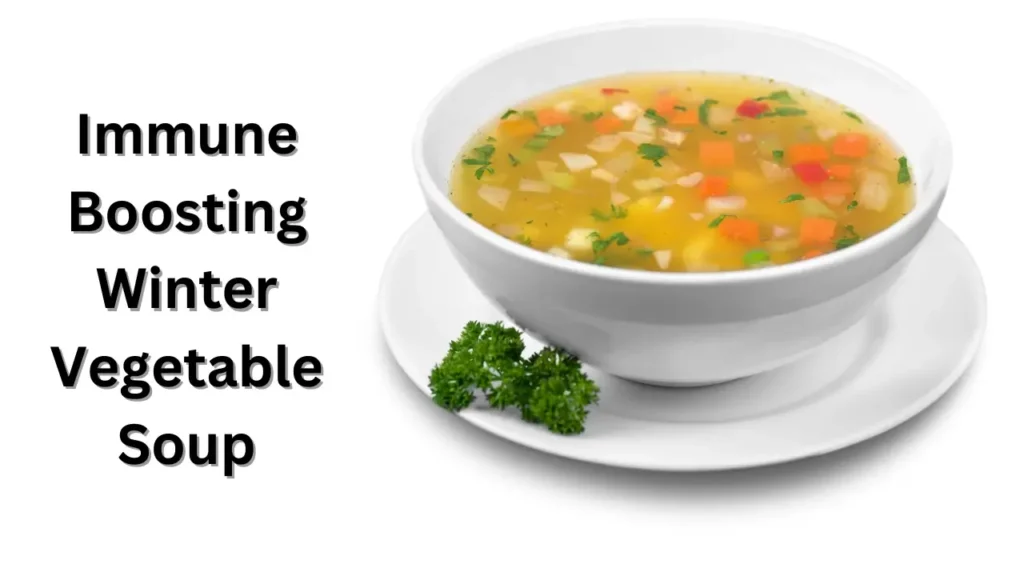
Serve the soup hot with a side of whole-grain bread or roti for a complete and comforting winter meal. The vibrant flavors and nutrient-dense ingredients make this recipe a perfect addition to your list of immune boosting foods in winter.
Why This Recipe Works:
- Turmeric and Ginger: Anti-inflammatory spices that enhance immunity.
- Spinach and Seasonal Vegetables: Packed with vitamins and antioxidants to protect against infections.
- Protein-Rich Lentils or Chickpeas: Support overall immune health and provide sustained energy.
This soup not only keeps you warm but also fortifies your body against winter ailments. It’s easy to prepare, flavorful, and packed with the goodness of immune boosting foods in winter. Try it today and enjoy the benefits of seasonal nutrition!
Conclusion: Embrace Immune Boosting Foods in Winter
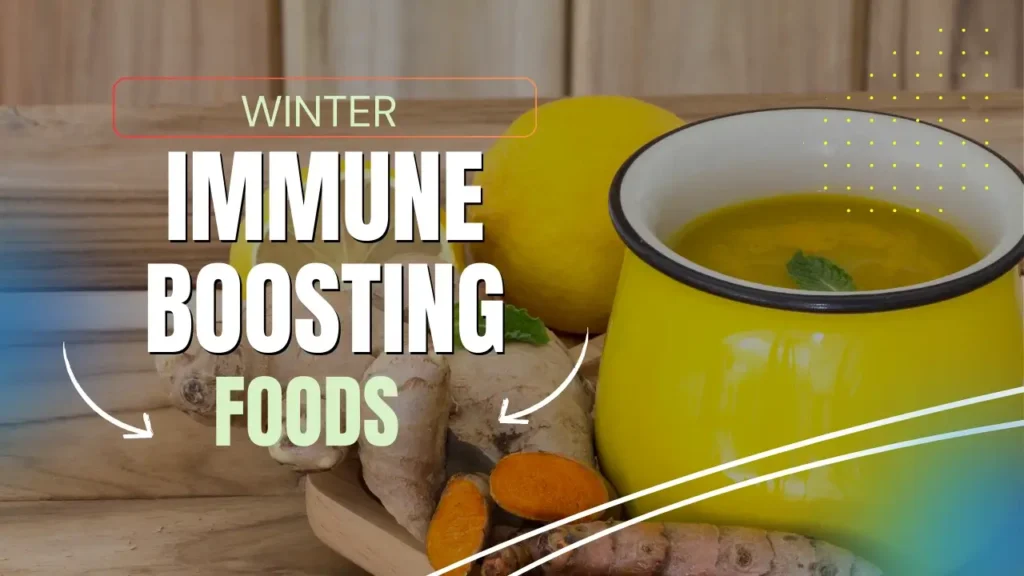
Incorporating immune boosting foods in winter into your diet is a simple yet powerful way to stay healthy during the colder months. From citrus fruits to warming spices, these foods offer an abundance of nutrients to fortify your immune system. By making conscious dietary choices and adding these seasonal foods to your meals, you can enjoy the winter season without compromising your health.
